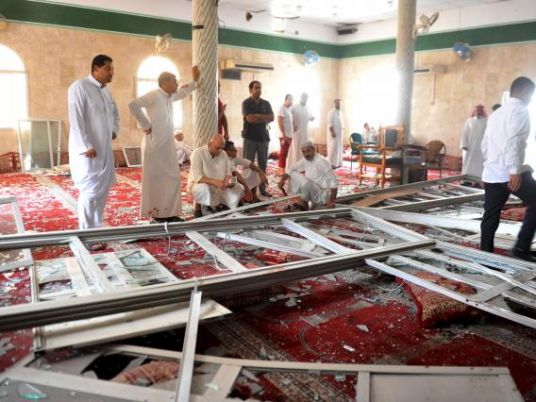
Saudi Arabia's top Sunni cleric on Saturday branded a deadly attack on Shi'ite Muslims a bid to sow chaos, after villagers targeted in the bombing vented their anger at what they saw as the Sunni-dominated government's indifference to their safety.
Thousands of protesters took to the streets of al-Qadeeh town on Friday evening, hours after a suicide bomber killed 21 worshippers in a packed Shi'ite mosque, the first attack in the conservative kingdom to be claimed by Islamic State militants.
The Saudi interior ministry identified the perpetrator as Saleh bin Abdul Rahman Saleh Qashimi, a Saudi citizen wanted for belonging to Islamic State. The militant group had identified him the day before by a nom de guerre, Abu 'Ammar al-Najdi.
Saudi authorities determined that Qashimi belonged to a wider militant cell, from which 26 suspects have been arrested to date, the ministry said, without providing any details.
Demonstrators mourning the victims said security forces had left their communities unprotected, arguing that the official Wahhabi school of Sunni Islam inspires Sunni militants and encourages intolerance of the kingdom's Shi'ite minority.
It was one of the deadliest assaults in recent years in the largest Gulf Arab country, where sectarian tensions have been aggravated by nearly two months of Saudi-led air strikes on Shi'ite Houthi rebels in neighboring Yemen.
The kingdom's top Sunni cleric, Grand Mufti Sheikh Abdulaziz Al al-Sheikh, told state Al Ekhbariya TV on Saturday: "This totally criminal plot aims to split our ranks and sow chaos in our country but, God be praised, it will not find a way. The nation and society are united and under a wise leadership."
Sheikh Mohammed Obeidan, a top local Shi'ite cleric, urged followers not to give into their anger and to keep the peace.
"We'll stand before anyone who thinks that our creed is a cause for fear or worry … mass prayer – in a calm, orderly way with self restraint – is the right way to respond to this corrupt force and hateful darkness," he told worshippers.
Regional rival
But resentment in al-Qadeeh was running high.
A video posted online by local activists showed a policeman standing over the limbs of the bomber inside the stricken mosque and apparently saying "God rest his soul", only to get screamed at by residents whose white robes were smeared with blood. Reuters was unable immediately to verify its authenticity.
"Our streets are patrolled by armored vehicles – this makes people think their forces are against us," said a local activist reached by telephone. "After the attack yesterday they deployed eight – why send these damn things? We're peaceful people."
"From grade one, the state curriculum tells us Shi'ites aren't real Muslims. I'm a Saudi citizen, why do you force me to study this?" he said.
Most Saudis adhere to the rigid Wahhabi school of Sunni Islam that deems Shi'ism heretical, and some members of the majority fear Shi'ites' first loyalty is to regional rival Iran.
The community denies this and demands an end to what Shi'ites see as neglect. Most Shi'ites live in Eastern Province, where Saudi Arabia, the world's top oil exporter, pumps the bulk of its petroleum.
Saudi Interior Ministry spokesman Mansour Turki told state television the kingdom was seeking to root out Islamic State's presence, especially after a gun attack on a Shi'ite mosque that killed five people in nearby Ahsa village in November.
The ministry said last month that it had arrested 93 suspected members of the group.




